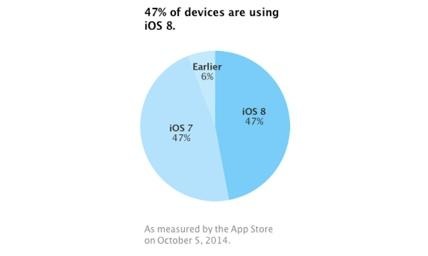iOS 8 Adoption: Why 6% Matters More Than 47%
A lot of attention has been thrust on iOS 8 adoption rates lately, as downloads seem to have stagnated. With 47% of iOS devices running the latest version, it matches iOS 7 for device software supremacy. Now that the two are at a stalemate, it seems it may not matter much just yet. Here's why.
The first thing to note about iOS 8 adoption rates is that in the "walled garden" that is iOS, there's no turning back. It's not open source, and is fairly difficult to turn around and go back to iOS 7 if you're not a fan of iOS 8. At some point, the update will be thrust upon you, too, making iOS 7 a memory.
In examining the Apple Developer portal, we find that both iOS 7 and iOS 8 are at 47%. That's less than important to the overall picture for two reasons. First, there are only three segments: iOS 7, iOS 8, and "Earlier". The differences between iOS 7 and 8, for the average user, are negligible.

Second, it's not a matter of overcoming iOS 7 — it's that 6% on "Earlier" that really matter. Holdouts on iOS 6 or (shudder at the thought) earlier versions really lag behind. With a free iPhone 5C and an iPhone 5S that has seen a significant price drop since the iPhone 6 tandem came into the picture, those 6%-ers will have a better reason to upgrade their hardware, which will make the software upgrade a natural thing.
It's entirely possible some users with older iPhones think they need an iPhone 6 or 6 Plus to take advantage of iOS 8, too. With regard to Apple Pay, they're right. Upgrading is possible for most users, but it's not a big deal yet for one important reason.
iOS 8 is half-baked in many respects. Apple took a series of big gambles that will need time to pay off. Apple Pay, HealthKit, Metal — those are all very iOS 8 things, and platforms that need better third-party support before they matter to the casual user.
Aside form some neat features like interactive notifications, iOS 8 isn't actually necessary yet. While I'm enjoying it, I'd be fine on iOS 7, too. Like Android, the "fragmentation" chatter is interesting, but we're pretty sure nobody is suffering from a lack of bleeding-edge software.
Source: Apple
